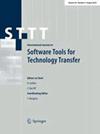Decision-making under uncertainty: beyond probabilities
IF 1.4
3区 计算机科学
Q4 COMPUTER SCIENCE, SOFTWARE ENGINEERING
International Journal on Software Tools for Technology Transfer
Pub Date : 2023-05-30
DOI:10.1007/s10009-023-00704-3
引用次数: 3
Abstract
Abstract This position paper reflects on the state-of-the-art in decision-making under uncertainty. A classical assumption is that probabilities can sufficiently capture all uncertainty in a system. In this paper, the focus is on the uncertainty that goes beyond this classical interpretation, particularly by employing a clear distinction between aleatoric and epistemic uncertainty. The paper features an overview of Markov decision processes (MDPs) and extensions to account for partial observability and adversarial behavior. These models sufficiently capture aleatoric uncertainty, but fail to account for epistemic uncertainty robustly. Consequently, we present a thorough overview of so-called uncertainty models that exhibit uncertainty in a more robust interpretation. We show several solution techniques for both discrete and continuous models, ranging from formal verification, over control-based abstractions, to reinforcement learning. As an integral part of this paper, we list and discuss several key challenges that arise when dealing with rich types of uncertainty in a model-based fashion.不确定性下的决策:超越概率
摘要本文对不确定条件下决策的研究现状进行了反思。一个经典的假设是,概率可以充分捕捉系统中所有的不确定性。在本文中,重点是超越这种经典解释的不确定性,特别是通过对任意不确定性和认知不确定性之间的明确区分。本文概述了马尔可夫决策过程(mdp)和扩展,以解释部分可观察性和对抗行为。这些模型充分捕捉到任意的不确定性,但不能健壮地解释认知的不确定性。因此,我们对所谓的不确定性模型进行了全面的概述,这些模型在更稳健的解释中表现出不确定性。我们展示了离散和连续模型的几种解决方案技术,从形式验证、基于控制的抽象到强化学习。作为本文的一个组成部分,我们列出并讨论了在以基于模型的方式处理丰富类型的不确定性时出现的几个关键挑战。
本文章由计算机程序翻译,如有差异,请以英文原文为准。
求助全文
约1分钟内获得全文
求助全文
来源期刊

International Journal on Software Tools for Technology Transfer
Computer Science-Information Systems
CiteScore
4.50
自引率
6.70%
发文量
39
期刊介绍:
The International Journal on Software Tools for Technology Transfer (STTT) provides a forum for the discussion of all aspects of tools supporting the development of computer systems. It offers, above all, a tool-oriented link between academic research and industrial practice.
Tool support for the development of reliable and correct computer-based systems is of growing importance, and a wealth of design methodologies, algorithms, and associated tools have been developed in different areas of computer science. However, each area has its own culture and terminology, preventing researchers from taking advantage of the results obtained by colleagues in other fields. Tool builders are often unaware of the work done by others, and thus unable to apply it. The situation is even more critical when considering the transfer of new technology into industrial practice.
 求助内容:
求助内容: 应助结果提醒方式:
应助结果提醒方式:


